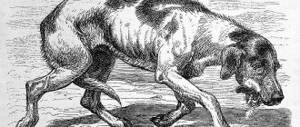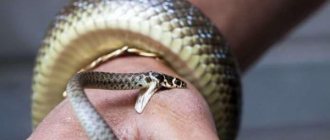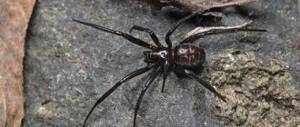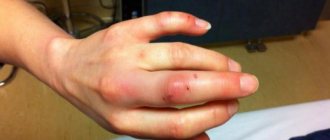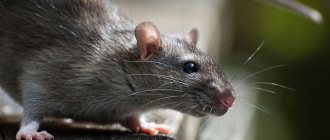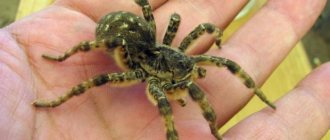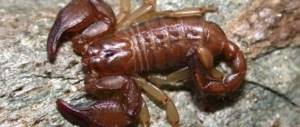Bed bugs have once again made people talk about themselves. As a result of urbanization, increased international tourism and other factors, the modern generation has experienced the unpleasant consequences of bedbug bites - intrusive bed parasites. The American Center for Disease Control and Prevention reports the highest level of infection in history.
Unlike other bloodsuckers, bedbugs do not carry diseases, but nevertheless pose a threat to a person’s physical and even mental health.
Why is a dog bite dangerous for humans?
Wounds from contact with an animal are divided into superficial and deep. In the first case, only the integrity of the skin is damaged, in the second, blood vessels and muscles are damaged. Possible complications and consequences of a dog bite:
- bleeding (internal or external);
- bone fractures (from bites of limbs);
- wound suppuration, blood poisoning;
- rupture of tendons, muscles;
- infections (bacterial, viral);
- psychological trauma, especially when a child is bitten.
Signs of a bacterial infection
If you are bitten by a domestic dog, the risk of contracting dangerous diseases is lower than from a stray dog. Upon contact with dog saliva, pathogenic microorganisms enter the victim's wound, which threatens the development of sepsis. Signs of a bacterial infection may appear on the second day after the bite:
- swelling of the skin around the wound;
- redness of the inflammation;
- increased body temperature;
- dizziness, weakness;
- the appearance of purulent contents in the wound;
- enlarged lymph nodes.
Symptoms of rabies
If a child or adult is bitten by a stray dog, the risk of having the virus is very high. Symptoms of rabies in a dog:
- drooling with copious foam;
- strabismus;
- whole body spasms;
- tongue falling out of the mouth;
- redness of the cornea of the eyes;
- difficulty swallowing;
- paralysis of the hind limbs, pharynx.
The dog’s behavior also changes – a state of apathy alternates with causeless aggression. The animal hides from everyone or constantly fawns over people, grabs and gnaws all surrounding objects, even the ground, attacks silently, without barking, refuses water and whines.
How hornets attack
Hornets show particular aggression when defending their home. At first, one hornet may attack, but soon a whole swarm flocks to the smell of the signal aroma released during an attack. At the same time, wasps sting everyone who is closer, even if they do not take part in the destruction of the nest. The European representative of the species has a sting of 3 mm, while the more dangerous Asian one has a sting of 6 mm.
The aggressiveness of the insect is quite controversial . If you don’t touch him, don’t stir up the nest or accidentally crush him, then he attacks extremely rarely. If there is danger, the hornet first of all tries to hide, but if this is impossible, then it takes a defensive position. Smaller specimens sting more often; their larger counterparts are peaceful.
First aid for a dog bite
Wounds of any severity should be treated quickly. Step-by-step actions for a dog bite:
- Examine the injuries to determine the severity of the injury (arm swollen, visible bone, etc.).
- Stop bleeding if there is any. Venous requires applying a pressure bandage; to stop arterial, bandage the area just above the wound with a tourniquet.
- Wash the bite area with a solution of laundry soap.
- Treat the wound with an antiseptic (Chlorhexidine, Furacilin). Lubricate the skin around with brilliant green or iodine.
- Apply antibiotic ointment to the bite.
- Cover the wound with a sterile dressing. There is no need to bandage it tightly so that the blood slowly flows out along with the remains of the animal’s saliva.
- Give the victim an anesthetic (Ketanov).
Preventive measures to combat cockroaches
These insects easily adapt to changing conditions. Resistant to almost all currently existing means of combating them.
However, there are several rules, extremely simple, that will help you get rid of this unpleasant neighborhood:
- seal all cracks in walls, floors, etc., to block entry points into the home;
- if the wallpaper has come off, re-glue it, otherwise cockroach ovipositors will appear there;
- fix leaking plumbing, especially pipes;
- Do not water indoor plants before going to bed; carefully remove moisture from kitchen tables and other pieces of furniture;
- install air ducts with fine grilles;
- Do not leave food residues on the tables, especially those with a strong smell; remove even crumbs.
Let's celebrate! Well, if cockroaches still appear, call exterminators. This, by the way, is the most reliable way to get rid of insect infestations.
Where to go if bitten by a dog
After first aid is provided, the bitten person must be taken to the emergency room. The doctor will examine you, stitch the laceration, give you an injection of antibiotics (Doxycycline) and prescribe treatment. The child needs help from a psychologist.
If it is known for sure that the attacking dog was vaccinated against rabies, the bitten person only needs a tetanus injection.
If a dog is suspected of having rabies or the victim’s blood test is positive for a dangerous virus, vaccination is required. It is carried out according to a certain scheme and the first injection must be given no later than 8 hours after the bite:
- 1 injection – upon treatment. If the head and neck are affected, then rabies immunoglobulin is administered together with the vaccine. It neutralizes the effect of the virus.
- 2nd injection – on the third day. If it was not possible to administer the vaccine on time, you can do it within 10–12 days after the last injection.
- 3 – 7 days after injury.
- 4 – 14 days after the bite.
- 5 – one month from the date of infection.
- 6 – 3 months after the first application.
One year after the last injection, the last vaccination is carried out for prevention. The injection site for all 7 injections is the forearm area, and not the stomach, as before. This became possible due to the creation of more powerful vaccines against hydrophobia. If a rabid dog is found and survives for 10 days, the victim is given 3 injections - 1, 3, 7 days of treatment.
When a vaccine may not work
Vaccination does not provide a 100% guarantee. It may not work under the following conditions:
- late vaccination (more than 8 hours after the bite);
- long-term use of medications (immunosuppressants, glucocorticoids);
- alcohol effects on the human body;
- weakened immunity (chronic diseases, viruses);
- expired vaccine;
- missed anti-rabies injections.
Why do people bite their lips and how to get rid of this bad habit?
The habit of biting the upper or lower lip is common to many people, and those men and women who have this habit often do not even notice that they are biting their lips while talking or thinking about some serious issue.
Meanwhile, biting your lips is not only unaesthetic, but even harmful to a person, because you can chew delicate skin until it bleeds and cause inflammation, which will cause unsightly, painful cracks to appear on your lips, which are quite difficult to get rid of.
It is obvious that a person’s habits play an important role in creating his individuality, and by the totality of habitual gestures and patterns of behavior in a given situation, one can determine the character traits of an individual. Facial expressions and gestures can say a lot about a person, and also make his behavior and manner of conversation more vivid and emotionally rich. But not all habits are good, and the tendency to bite your lips is one of those habits that you want to get rid of.
The muscles of a person’s face are in motion most of the time, because we talk, smile, frown, purse our lips, laugh.
Facial gestures reflect our feelings and mood, and lips play a significant role in human facial expressions, since most emotions are reflected precisely on the lower part of the face.
But if a smile reflects positive emotions, then lip biting is a facial gesture, indicating in most cases that a person feels insecure, fear, confusion or some other negative emotions.
Many psychologists believe that the habit of biting lips appears in people even in childhood , and the reason for its formation is difficult relationships in the family and a lack of love for the child on the part of the mother and father. For example, if parents often scold a child for crying and bickering, the baby may begin to bite his lips in order to hold back tears and indignation. Over time, this conscious action turns into a habit, and the child will bite his lip every time he needs to hold back negative emotions. The answer to the question why people bite their lips in adulthood, when they realize that this habit is unsightly and harmful, is also simple: lip biting helps to cope with emotions and calm down . Since it is human nature to “throw out” their emotions through facial expressions and gestures, people replace crying, indignation and other manifestations of dissatisfaction with biting the sensitive skin of their lips. And after the emotional outburst is expressed through lip biting, the person feels relief and can calm down. Another reason for biting your lips in a state of stress, emotional outburst or nervous tension is the desire to “pull yourself together.” Physical pain is sobering, so many people, in moments of severe mental shock, hurt themselves in one way or another - hitting a wall with a fist or an open palm, digging their nails into their palms, biting their lips until they bleed, etc.
And the last reason why people bite their lips is purely physiological - many in this way want to get rid of rough skin on the lips, which causes discomfort.
In the cold and strong winds, the lips become chapped, crack and become rough to the touch, and some people try to chew off the rough and flaky crust.
It should be noted that biting your lips in this case will only worsen the situation, because bleeding wounds will appear at the site of the bitten skin, so to avoid damaging the thin skin of your lips, it is better to use chapstick or other similar products.
You can and should get rid of the bad habit of biting your lips. Unfortunately, it is almost impossible to stop biting your lips in one day, but in a few weeks it is quite possible to get rid of this established tendency. To do this, you need to take a set of actions, including:
- Establishing control over facial expressions and gestures. A person who wants to get rid of this bad habit needs to constantly remind himself that he can start biting his lips, and try to control his facial expressions in moments of emotional outbursts, irritation or deep thought. It is also a good idea to remind yourself of the consequences of this bad habit - unsightly cracks and inflammation on the lips that appear due to constant biting of delicate skin.
- Lip care. The presence of cracked and flaky crusts on the lips causes discomfort and the desire to chew off dead skin, so constant lip care can help cope with this bad habit. Taking vitamins that have a beneficial effect on the condition of the skin, as well as the use of cosmetics (hygienic lipsticks, gels and lip balms, etc.) will help quickly eliminate inflammation and normalize the condition of the lips, and thus remove the reason for the desire to bite them.
- Relieving stress and anxiety, restoring mental balance. Since lip biting is usually a manifestation of negative emotions, in order to get rid of this bad habit, you need to eliminate the very source of negative emotions. By limiting or reducing communication with conflicting people, wisely planning your time to avoid haste and emergency situations, and not taking everything that happens to heart, you can get rid of most of the reasons for dissatisfaction and irritation, and therefore the reason for biting your lips.
- Finding new hobbies and adding variety to your leisure time. New hobbies and adding bright colors to your life help you cope with many bad habits, as well as get rid of stress and anxiety. Therefore, pursuing hobbies, meeting with friends and like-minded people, self-development and gaining confidence in yourself and your abilities is an important step towards getting rid of the bad habit of biting your lips.
Source: https://sam-sebe-psycholog.ru/articles/pochemu-lyudi-kusayut-guby-i-kak-izbavitsya-ot-etoy-vrednoy-privychki
Video
Pet bites
Attention! The information presented in the article is for informational purposes only. The materials in the article do not encourage self-treatment. Only a qualified doctor can make a diagnosis and give treatment recommendations based on the individual characteristics of a particular patient.
